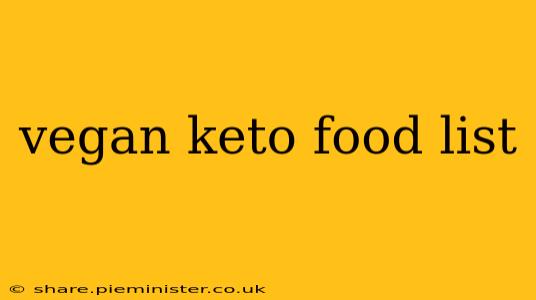Embarking on a vegan ketogenic diet might seem challenging, but with careful planning and an understanding of macronutrients, it's entirely achievable and incredibly rewarding. This comprehensive guide provides a detailed vegan keto food list, addressing common questions and offering tips to make this lifestyle sustainable and enjoyable.
What is Vegan Keto?
Vegan keto combines the principles of veganism (excluding all animal products) with the ketogenic diet (a very low-carbohydrate, high-fat diet). The goal is to achieve ketosis, a metabolic state where your body burns fat for fuel instead of carbohydrates. This requires drastically reducing carbohydrate intake while consuming moderate protein and high healthy fats. The challenge lies in finding plant-based sources rich in healthy fats and low in carbohydrates.
Key Foods for Your Vegan Keto Diet
This list categorizes vegan keto-friendly foods based on their macronutrient profile. Remember to always check nutrition labels as values can vary between brands and products.
High-Fat Foods:
- Avocados: A keto staple, avocados are packed with healthy monounsaturated fats and fiber. Enjoy them whole, in guacamole (made with low-carb spices), or blended into smoothies.
- Nuts and Seeds: Macadamia nuts, Brazil nuts, pecans, chia seeds, flaxseeds, and pumpkin seeds offer healthy fats and some protein. Consume in moderation due to their calorie density.
- Nut Butters: Almond butter, macadamia nut butter, and cashew butter (in moderation) are excellent sources of healthy fats. Opt for brands without added sugar.
- Coconut Products: Coconut oil, coconut cream (full-fat), and coconut flakes (unsweetened) contribute healthy fats to your diet. Coconut aminos can be a good alternative to soy sauce.
- Olives and Olive Oil: These provide healthy monounsaturated fats and add flavor to dishes.
- Vegan Mayonnaise: Choose a low-carb, sugar-free option.
Moderate-Protein Foods:
- Tofu: Firm or extra-firm tofu is a good source of protein, but watch portion sizes as it can contain some carbs.
- Tempeh: Similar to tofu, tempeh is a good source of plant-based protein.
- Hemp Seeds: A complete protein source, meaning they contain all nine essential amino acids.
- Edamame (in moderation): While containing some carbs, edamame can be included in small quantities.
Low-Carb Vegetables:
- Leafy Greens: Spinach, kale, lettuce, collard greens are all low in carbs and high in nutrients.
- Cruciferous Vegetables: Broccoli, cauliflower, Brussels sprouts, cabbage (in moderation).
- Other Low-Carb Vegetables: Asparagus, zucchini, bell peppers (green are lowest in carbs), mushrooms, celery, cucumber.
Foods to Limit or Avoid on a Vegan Keto Diet:
- High-Carb Vegetables: Potatoes, sweet potatoes, corn, carrots, peas.
- Legumes: Beans, lentils, chickpeas. These are high in carbohydrates and fiber.
- Fruits: Most fruits are high in sugar and carbohydrates. Small portions of berries may be acceptable occasionally.
- Grains: Bread, rice, pasta, cereals.
- Processed Vegan Foods: Many vegan processed foods contain hidden sugars and carbs. Always check nutrition labels.
Frequently Asked Questions about Vegan Keto
What are some easy vegan keto recipes?
Plenty of simple recipes exist! Consider avocado-based dishes, stir-fries with low-carb vegetables and tofu, cauliflower rice bowls with various toppings, and salads with healthy fats like nuts and seeds.
How many carbs can I eat on a vegan keto diet?
The recommended carbohydrate intake for keto is typically 20-50 grams per day, but this can vary depending on individual factors. It's essential to monitor your carb intake closely and adjust accordingly to maintain ketosis.
Can you lose weight on a vegan keto diet?
Yes, many people successfully lose weight on a vegan keto diet. By prioritizing healthy fats and minimizing carbohydrates, you create a calorie deficit, leading to weight loss. However, individual results may vary.
Is a vegan keto diet sustainable long-term?
It can be sustainable, but it requires careful planning and meal preparation. The key is to find enjoyable, low-carb vegan recipes and make this a lifestyle choice rather than a short-term diet. Supplementation with Vitamin B12 is crucial for vegans.
Are there any potential downsides to a vegan keto diet?
Some potential downsides include nutrient deficiencies if not carefully planned, constipation (due to low fiber), and potential kidney stress. It's crucial to consult with a healthcare professional or registered dietitian before starting any restrictive diet, especially if you have pre-existing health conditions.
This detailed vegan keto food list and FAQ section provides a solid foundation for your journey. Remember to listen to your body, adjust your intake as needed, and enjoy the process of exploring delicious and healthy vegan keto recipes. A balanced approach, including regular exercise and adequate hydration, is crucial for success.
